engine Citroen C4 PICASSO 2016 2.G Owners Manual
[x] Cancel search | Manufacturer: CITROEN, Model Year: 2016, Model line: C4 PICASSO, Model: Citroen C4 PICASSO 2016 2.GPages: 527, PDF Size: 13.72 MB
Page 274 of 527
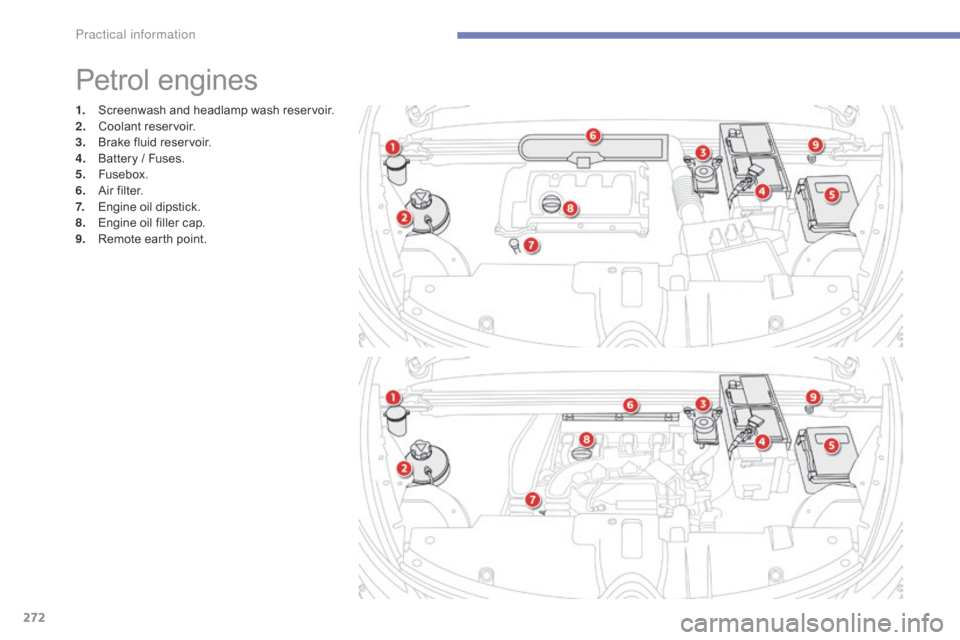
272
C4-Picasso-II_en_Chap07_info-pratiques_ed01-2016
1. Screenwash and headlamp wash reservoir.
2. C oolant r eservoir.
3.
B
rake fluid reservoir.
4.
B
attery / Fuses.
5.
F
usebox.
6.
A
ir filter.
7.
E
ngine oil dipstick.
8.
E
ngine oil filler cap.
9.
R
emote earth point.
Petrol engines
Practical information
Page 275 of 527
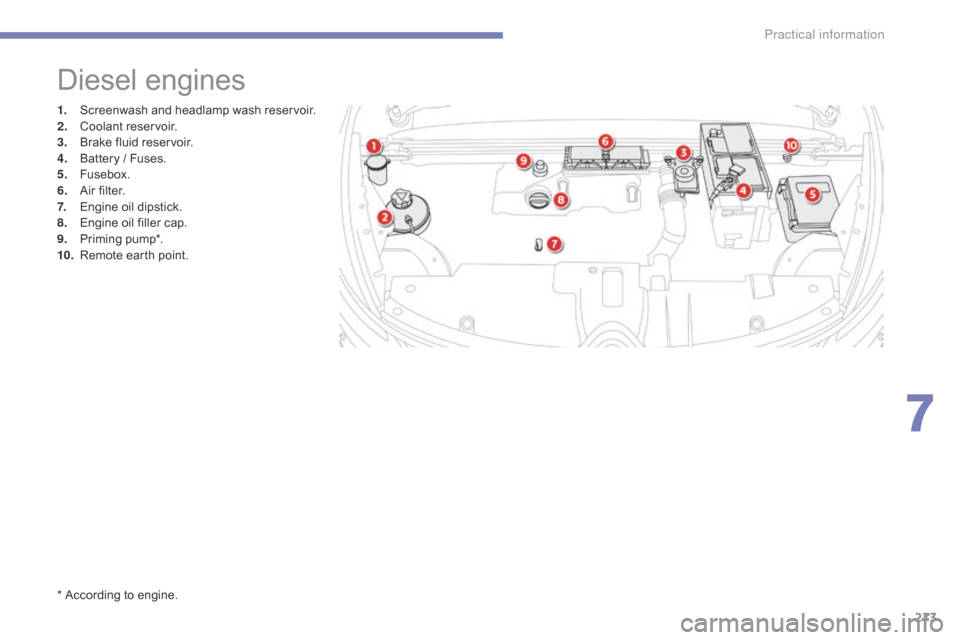
273
C4-Picasso-II_en_Chap07_info-pratiques_ed01-2016
1. Screenwash and headlamp wash reservoir.
2. C oolant r eservoir.
3.
B
rake fluid reservoir.
4.
B
attery / Fuses.
5.
F
usebox.
6.
A
ir filter.
7.
E
ngine oil dipstick.
8.
E
ngine oil filler cap.
9.
P
riming
pu
mp*.
10.
R
emote earth point.
Diesel engines
* According to engine.
7
Practical information
Page 276 of 527
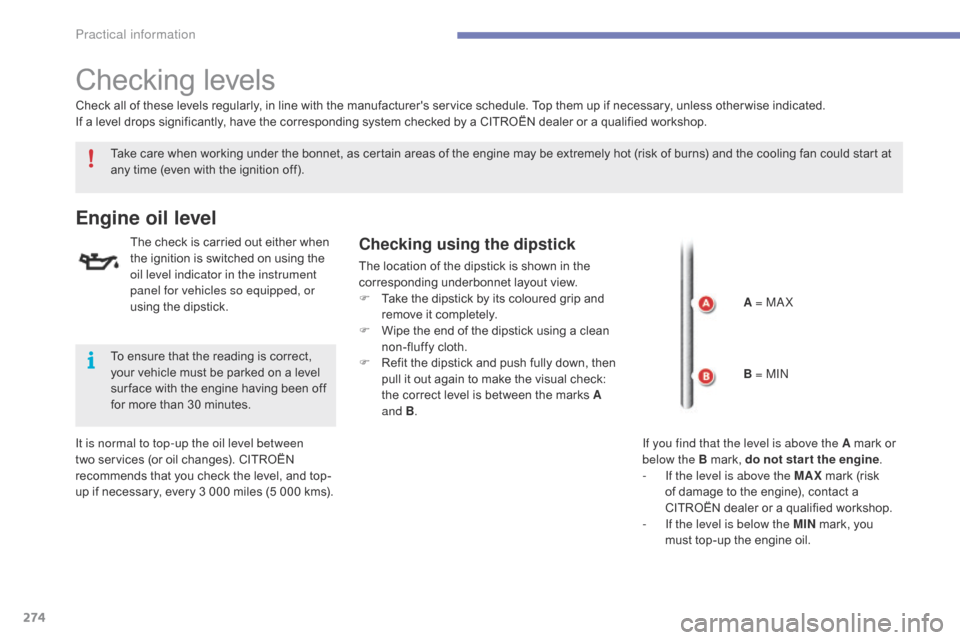
274
C4-Picasso-II_en_Chap07_info-pratiques_ed01-2016
Checking levels
Take care when working under the bonnet, as certain areas of the engine may be extremely hot (risk of burns) and the cooling fan could start at any time (even with the ignition off).
Engine oil level
The check is carried out either when the ignition is switched on using the
o
il level indicator in the instrument
panel for vehicles so equipped, or
using
the dipstick.Checking using the dipstick
The location of the dipstick is shown in the corresponding underbonnet layout view.
F
T
ake the dipstick by its coloured grip and
r
emove it completely.
F
W
ipe the end of the dipstick using a clean
n
on-fluffy cloth.
F
R
efit the dipstick and push fully down, then
p
ull it out again to make the visual check:
t
he correct level is between the marks A
and B .
It is normal to top-up the oil level between
two
services
(or
oil
changes).
CITROËN
r
ecommends
that
you
check
the
level,
and
top-
up
if
necessary,
every
3
000
miles
(5
000
kms).
Check
all
of
these
levels
regularly,
in
line
with
the
manufacturer's service schedule. Top them up if necessary, unless other wise indicated.
If
a
level
drops
significantly,
have
the
corresponding system checked by a CITROËN dealer or a qualified workshop.
To
ensure
that
the
reading
is
correct,
y
our
vehicle
must
be
parked
on
a
level
s
ur face
with
the
engine
having
been
off
f
or
more
than
30
minutes. A = MA X
B = MIN
If you find that the level is above the A
mark or
belo
w the B mark, do not star t the engine.
-
I
f the level is above the MAX
mark (risk
o
f damage to the engine), contact a
C
ITROËN dealer or a qualified workshop.
-
I
f the level is below the MIN
mark, you
m
ust top-up the engine oil.
Practical information
Page 277 of 527
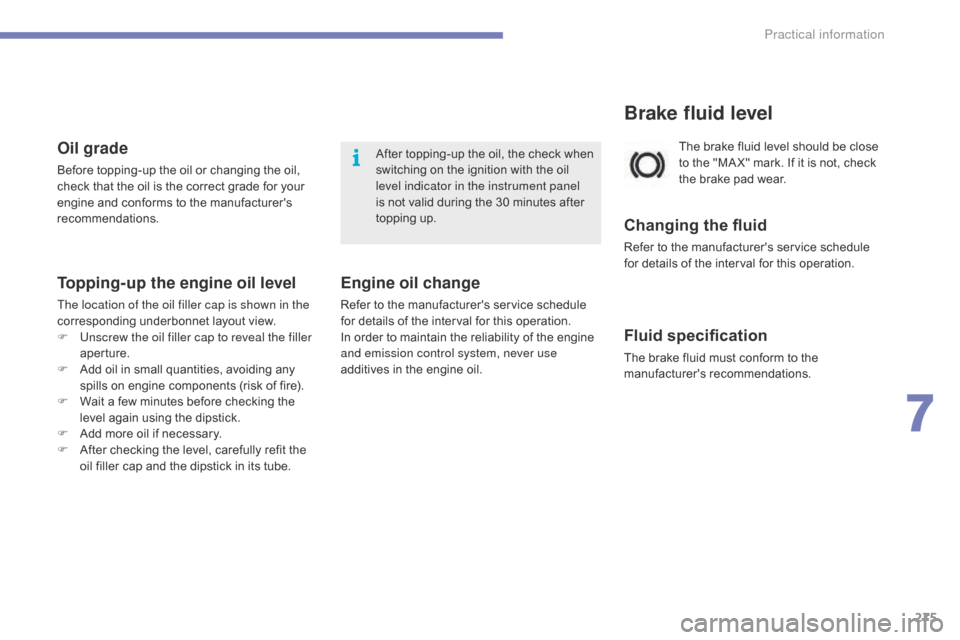
275
C4-Picasso-II_en_Chap07_info-pratiques_ed01-2016
The brake fluid level should be close to the "MA X" mark. If it is not, check
t
he brake pad wear.
Brake fluid level
Changing the fluid
Refer to the manufacturer's service schedule for details of the interval for this operation.
Fluid specification
The brake fluid must conform to the manufacturer's r ecommendations.
Topping-up the engine oil level
The location of the oil filler cap is shown in the
corresponding underbonnet layout view.
F
U
nscrew the oil filler cap to reveal the filler
aperture.
F
A
dd oil in small quantities, avoiding any
s
pills on engine components (risk of fire).
F
W
ait a few minutes before checking the
l
evel again using the dipstick.
F
A
dd more oil if necessary.
F
A
fter checking the level, carefully refit the
o
il filler cap and the dipstick in its tube.
Engine oil change
Refer to the manufacturer's service schedule for details of the interval for this operation.
In
order to maintain the reliability of the engine
a
nd emission control system, never use
additives
in the engine oil.
After
topping-up the oil, the check when
s
witching on the ignition with the oil
l
evel indicator in the instrument panel
is not valid during the 30 minutes after
t
opping up.
Oil grade
Before topping-up the oil or changing the oil, c
heck that the oil is the correct grade for your
e
ngine and conforms to the manufacturer's
r
ecommendations.
7
Practical information
Page 278 of 527
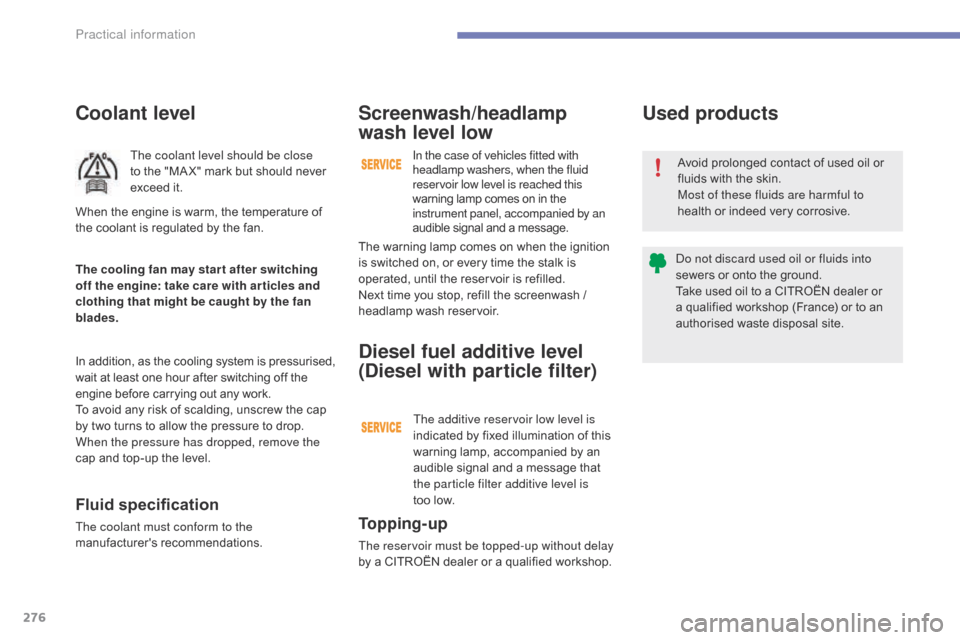
276
C4-Picasso-II_en_Chap07_info-pratiques_ed01-2016
Coolant level
The coolant level should be close
to the "MA X" mark but should never
e
xceed it.
In
addition, as the cooling system is pressurised,
w
ait
at
least one hour after switching off the
e
ngine
before carrying out any work.
To
avoid
any risk of scalding, unscrew the cap
b
y
two
turns to allow the pressure to drop.
W
hen the pressure has dropped, remove the
cap
and
top-up the level.
Fluid specification
The coolant must conform to the
manufacturer's r ecommendations.
The cooling fan may star t after switching
off the engine: take care with ar ticles and
clothing that might be caught by the fan
blades. When the engine is warm, the temperature of
t
he coolant is regulated by the fan.To p p i n g - u p
The reservoir must be topped-up without delay
by
a CITROËN dealer or a qualified workshop.
Diesel fuel additive level
(Diesel with particle filter)
The additive reservoir low level is
indicated by fixed illumination of this
w
arning lamp, accompanied by an
a
udible signal and a message that
t
he particle filter additive level is
too low.
The
warning lamp comes on when the ignition
i
s
switched on, or every time the stalk is
o
perated,
until the reservoir is refilled.
Next
time
you stop, refill the screenwash /
h
eadlamp
wash reservoir.
Screenwash/headlamp
wash level low
In the case of vehicles fitted with
headlamp washers, when the fluid
reservoir low level is reached this
warning
lamp comes on in the
in
strument panel, accompanied by an
audible
signal and a message. Avoid
prolonged contact of used oil or
f
luids with the skin.
Most of these fluids are harmful to
health
or indeed very corrosive.
Do not discard used oil or fluids into
sewers
or onto the ground.
Take
used oil to a CITROËN dealer or
a
qualified workshop (France) or to an
a
uthorised waste disposal site.
Used products
Practical information
Page 279 of 527
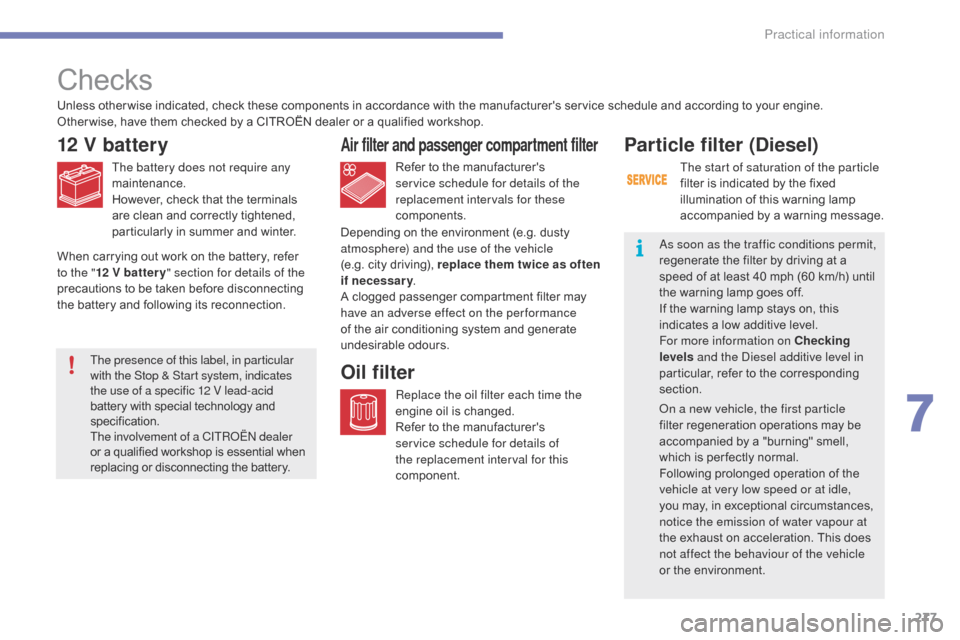
277
C4-Picasso-II_en_Chap07_info-pratiques_ed01-2016
Checks
12 V battery
The battery does not require any
maintenance.
However, check that the terminals
a
re clean and correctly tightened,
p
articularly in summer and winter.Refer
to the manufacturer's s
ervice schedule for details of the
replacement intervals for these
components.
Air filter and passenger compartment filter
Replace the oil filter each time the
engine oil is changed.
Refer
to the manufacturer's
s
ervice schedule for details of
the replacement interval for this
component.
Oil filterThe presence of this label, in particular
with the Stop & Start system, indicates
the use of a specific 12 V lead-acid
battery
with special technology and
s
pecification.
T
he involvement of a CITROËN dealer
or
a qualified workshop is essential when
r
eplacing or disconnecting the battery.
Unless
other wise indicated, check these components in accordance with the manufacturer's service schedule and according to your engine.
Other wise, have them checked by a CITROËN dealer or a qualified workshop.
Depending on the environment (e.g. dusty
a
tmosphere) and the use of the vehicle
(e.g. city driving), replace them twice as often
if necessary .
A clogged passenger compartment filter may
h
ave an adverse effect on the per formance
of the air conditioning system and generate u
ndesirable o dours.
Particle filter (Diesel)
The start of saturation of the particle
filter
is indicated by the fixed
i
llumination of this warning lamp
a
ccompanied by a warning message.
As soon as the traffic conditions permit,
regenerate
the filter by driving at a
s
peed of at least 40 mph (60 km/h) until
t
he
warning lamp goes off.
If
the warning lamp stays on, this
i
ndicates a low additive level.
For more information on Checking
levels and the Diesel additive level in
particular,
refer to the corresponding
s
ection.
On a new vehicle, the first particle
filter
regeneration operations may be
a
ccompanied by a "burning" smell,
w
hich is per fectly normal.
Following
prolonged operation of the
v
ehicle at very low speed or at idle,
you
may, in exceptional circumstances,
n
otice the emission of water vapour at
the
exhaust on acceleration. This does
n
ot affect the behaviour of the vehicle
or
the environment.
When
carrying
out
work
on
the
battery,
refer
t
o the " 12 V batter y " section for details of the
precautions
to
be
taken
before
disconnecting
t
he
battery
and
following
its
reconnection.
7
Practical information
Page 280 of 527
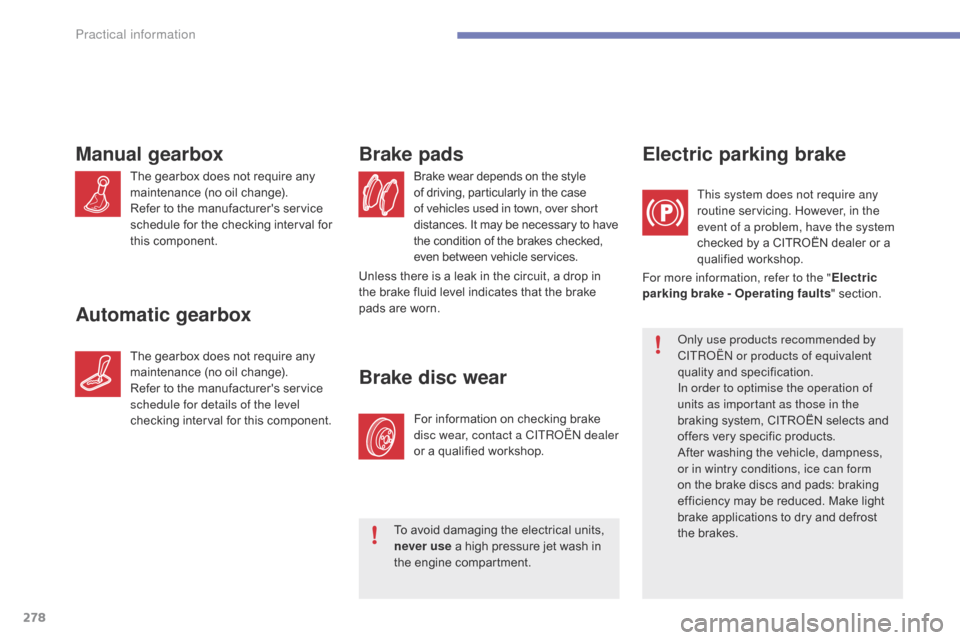
278
C4-Picasso-II_en_Chap07_info-pratiques_ed01-2016
Brake wear depends on the style of driving, particularly in the case o
f vehicles used in town, over short
distances.
It may be necessary to have
t
he condition of the brakes checked,
e
ven between vehicle services.
Brake pads
For information on checking brake disc wear, contact a CITROËN dealer
or
a qualified workshop.
Brake disc wear
Only use products recommended by
CITROËN or products of equivalent
quality
an
d
sp
ecification.
In order to optimise the operation of
units as important as those in the
braking
system, CITROËN selects and
o
ffers very specific products.
After
washing the vehicle, dampness,
o
r in wintry conditions, ice can form
on
the brake discs and pads: braking
e
fficiency may be reduced. Make light
b
rake applications to dry and defrost
t
he brakes.
Electric parking brake
For more information, refer to the " Electric
parking brake - Operating faults "
section.
This system does not require any
routine
servicing. However, in the
e
vent of a problem, have the system
checked by a CITROËN dealer or a
q
ualified
w
orkshop.
Manual gearbox
The gearbox does not require any m
aintenance (no oil change).
Refer
to the manufacturer's service
s
chedule for the checking interval for
t
his
c
omponent.
Automatic gearbox
The gearbox does not require any maintenance (no oil change).
Refer
to the manufacturer's service
s
chedule for details of the level
checking
interval for this component.
To
avoid damaging the electrical units,
n
ever use a high pressure jet wash in
t
he engine compartment.
Unless
there is a leak in the circuit, a drop in
t
he brake fluid level indicates that the brake
p
ads are worn.
Practical information
Page 281 of 527
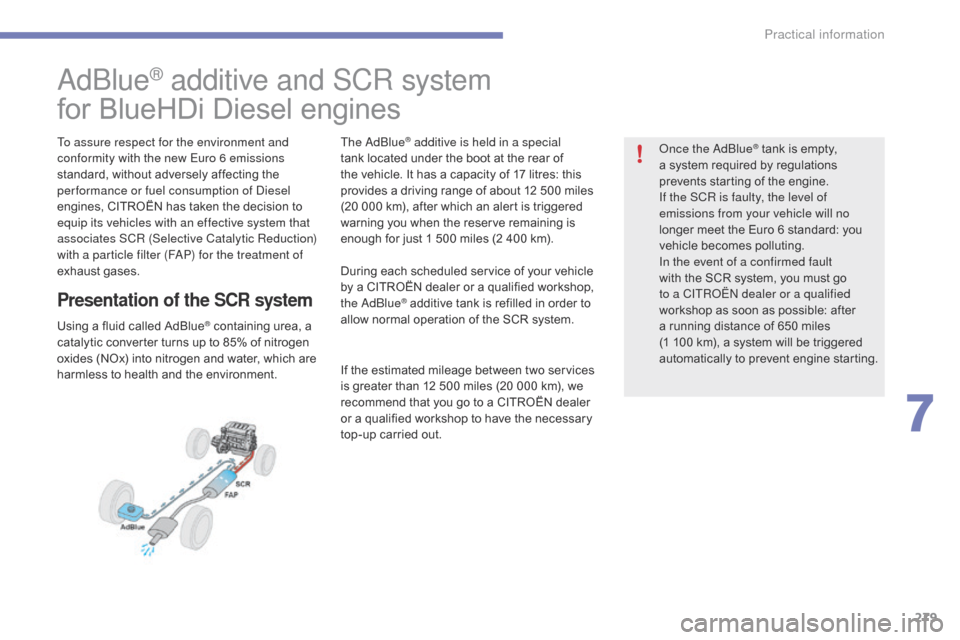
279
C4-Picasso-II_en_Chap07_info-pratiques_ed01-2016
AdBlue® additive and SCR system
for
BlueHDi Diesel engines
To assure respect for the environment and
conformity with the new Euro 6 emissions
standard,
without adversely affecting the
p
er formance or fuel consumption of Diesel
engines,
CITROËN has taken the decision to
e
quip its vehicles with an effective system that
associates SCR (Selective Catalytic Reduction)
with a particle filter (FAP) for the treatment of
exhaust
gases.
Presentation of the SCR system
Using a fluid called AdBlue® containing urea, a c
atalytic
converter
turns
up
to 85% of nitrogen
o
xides
(NOx)
into
nitrogen
and water, which are
h
armless
to
health
and
the
environment. The AdBlue
® additive is held in a special
tank
located
under the boot at the rear of
t
he
vehicle.
It has a capacity of 17 litres: this
p
rovides
a
driving range of about 12 500 miles
(
20
000
km),
after which an alert is triggered
w
arning
you
when the reserve remaining is
e
nough
for
just 1 500 miles (2 400 km).
During
each
scheduled service of your vehicle
b
y
a
CITROËN dealer or a qualified workshop,
t
he AdBlue
® additive tank is refilled in order to a
llow
normal operation of the SCR system.
If
the
estimated mileage between two services
i
s
greater
than 12 500 miles (20 000 km), we
r
ecommend
that you go to a CITROËN dealer
o
r
a
qualified workshop to have the necessary
t
op-up
carried out. Once the AdBlue
® tank is empty, a s
ystem
required
by regulations
p
revents
starting
of the engine.
If the SCR
is faulty, the level of
emissions from your vehicle will no
longer
meet
the
Euro 6 standard: you
v
ehicle
becomes
polluting.
In the event of a confirmed fault
with
the
SCR
system, you must go
t
o a CITROËN dealer or a qualified
workshop
as
soon as possible: after
a
running
distance of 650 miles
(
1 100
km),
a
system will be triggered
a
utomatically
to
prevent engine starting.
7
Practical information
Page 283 of 527
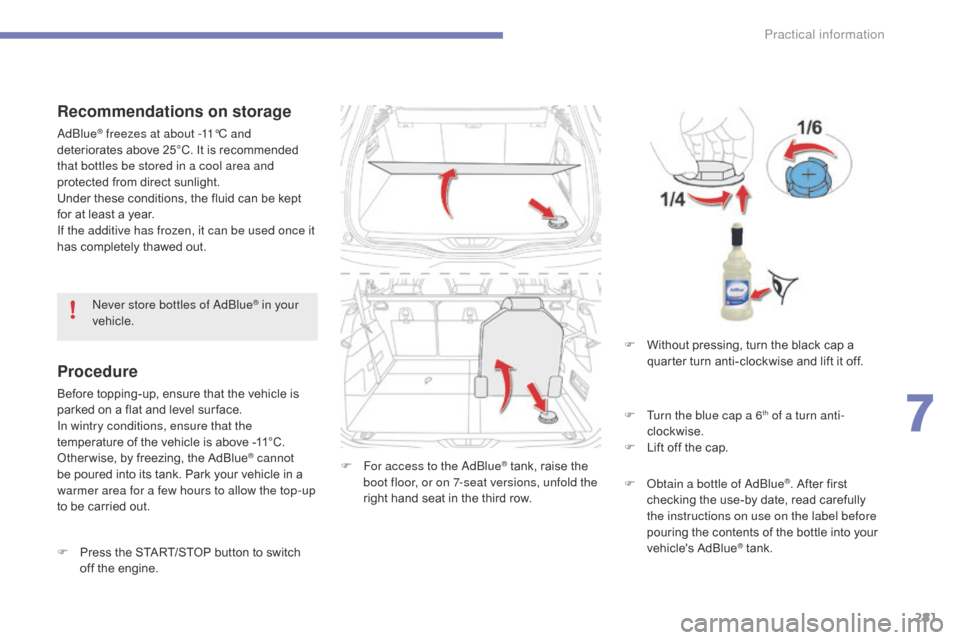
281
C4-Picasso-II_en_Chap07_info-pratiques_ed01-2016
Recommendations on storage
AdBlue® freezes at about -11°C and
deteriorates above 25°C. It is recommended
t
hat bottles be stored in a cool area and
protected
from direct sunlight.
Under
these conditions, the fluid can be kept
f
or
at
least a year.
If the additive has frozen, it can be used once it
has
completely thawed out.
Procedure
Before topping-up, ensure that the vehicle is parked on a flat and level sur face.
In wintry conditions, ensure that the
temperature
of the vehicle is above -11°C.
O
ther wise, by freezing, the AdBlue
® cannot
be
poured
into
its
tank.
Park
your
vehicle in a
w
armer area for a few hours to allow the top-up
to
be
carried
out.
F
P
ress
the
START/STOP
button
to switch
o
ff
the
engine. F
F or access to the AdBlue® tank, raise the b
oot floor, or on 7-seat versions, unfold the
right
hand
seat
in
the
third
row.
Never store bottles of AdBlue
® in your
vehicle.
F
W
ithout pressing, turn the black cap a
q
uarter turn anti-clockwise and lift it off.
F
T
urn the blue cap a 6
th of a turn anti-
clockwise.
F
L
ift
off
the
cap.
F
O
btain a bottle of AdBlue
®. After first c
hecking
the
use-by
date,
read carefully
t
he instructions on use on the label before
pouring
the
contents
of
the bottle into your
v
ehicle's
Ad
Blue
® tank.
7
Practical information
Page 284 of 527
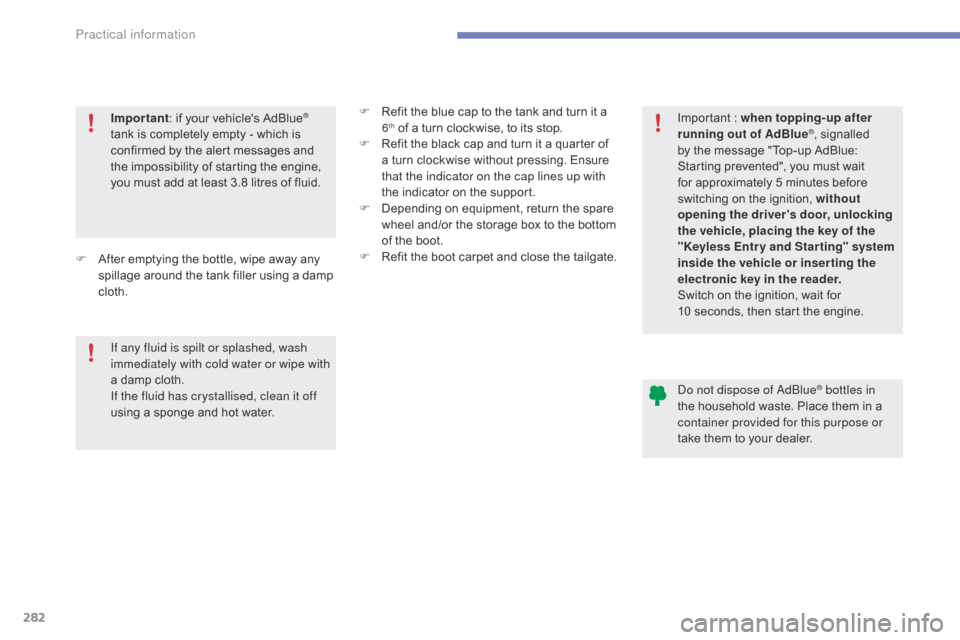
282
C4-Picasso-II_en_Chap07_info-pratiques_ed01-2016
Important: if your vehicle's AdBlue®
tank
is
completely
empty
-
which
is
c
onfirmed
by
the
alert
messages
and
t
he
impossibility
of
starting
the
engine,
y
ou
must
add
at
least
3.8
litres
of
fluid. Important
: w hen topping-up after
running out of AdBlue®, signalled b
y
the
message
"Top-up
AdBlue:
S
tarting
prevented",
you
must wait
f
or
approximately
5
minutes before
s
witching
on
the
ignition,
without
opening the driver's door, unlocking
the vehicle, placing the key of the
"Keyless Entr y and Star ting" system
inside the vehicle or inser ting the
electronic key in the reader.
Switch
on
the
ignition,
wait for
1
0 seconds,
then
start
the engine.
If any fluid is spilt or splashed, wash
immediately with cold water or wipe with
a
damp
cloth.
If the fluid has crystallised, clean it off
using
a
sponge
and
hot
water.
F
A
fter
emptying
the
bottle,
wipe
away
any
s
pillage
around
the
tank
filler
using
a
damp
c
loth. F
R
efit
the
blue
cap
to
the
tank
and
turn
it
a
6th of a turn clockwise, to its stop.
F
R
efit the black cap and turn it a quarter of
a
turn clockwise without pressing. Ensure
t
hat the indicator on the cap lines up with
the
indicator on the support.
F
D
epending on equipment, return the spare
w
heel and/or the storage box to the bottom
o
f
the boot.
F
R
efit the boot carpet and close the tailgate.
Do not dispose of AdBlue
® bottles in
the
household
waste.
Place them in a
c
ontainer provided for this purpose or
take
them
to
your
dealer.
Practical information